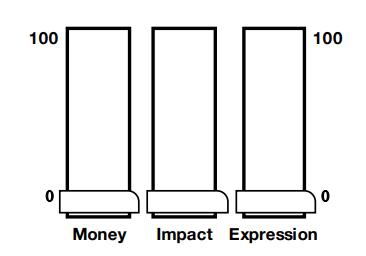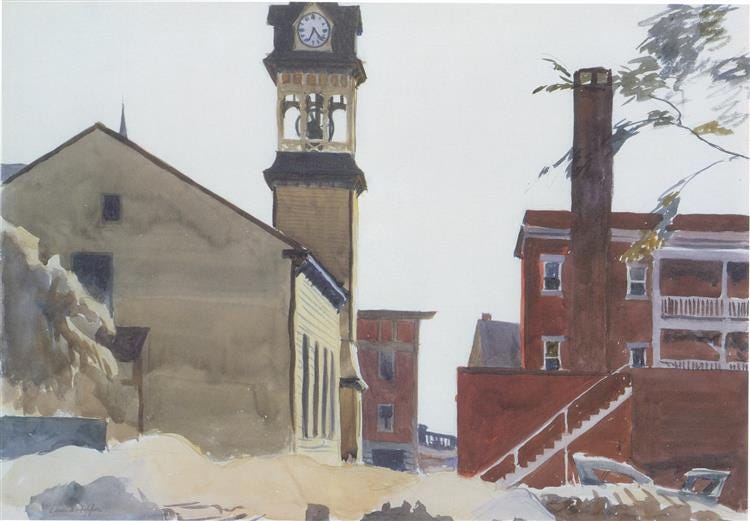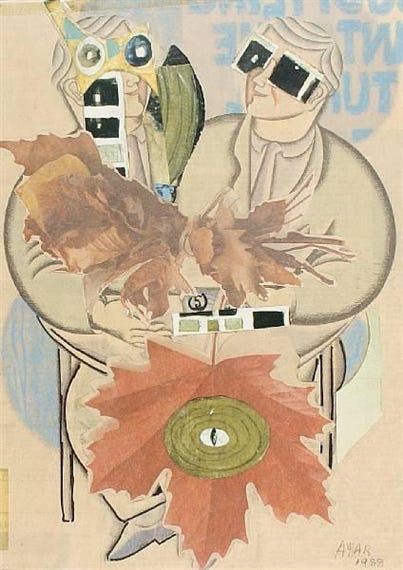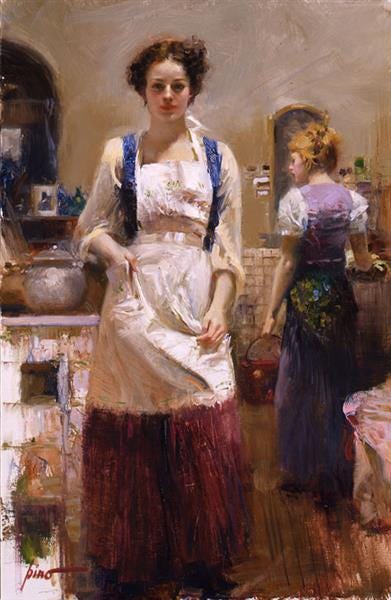#35 - Exactly What You Think
What Matters; Frequency of Public Intercourse; Weird Ingredient Cookbooks
Hello, my friends,
It rained unexpectedly on Wednesday and I experienced the return of a familiar feeling combining innocence, possibility, and freshness. It is something that I’ve experienced occasionally since childhood and because I don’t know what triggered it this time or what it means, I’m going to do nothing and let it be. Overall, my level of joy has been below-average the past few weeks which reminds me of a tanka I just made up:
temple bell in the wind... my mind ringing with the constant clangor of everything nothing everything
What Matters
Originally I was planning to wail away on the question of whether poetry matters but every time I thought about it I felt I could not move forward without addressing the core of the issue. In brief: What does it mean to matter? There are a few possible approaches to this deeply philosophical question and since I am doing no research prior to this writing I will address them in a limited and totally unscientific way.
To start, in the immediate present, what has our attention matters the most because when it comes to consciousness, all we have at any one moment is the tip of our sensory input. Thanks to the existence of our bodies and persistent memory, the next level of “mattering” is our physical and mental condition. Pain, hunger, fatigue are all of such importance that when we experience them, we can think of almost nothing else. Finally, once our basic needs are met, everything else follows. Here is where the majority of our priorities become apparent.
The place of something like poetry is complicated partially because its consequences tend to be intangible (unless it makes someone vomit), its importance is broken down between poets and readers, and its range is so wide. Certain poetry, when read by the right people, may inspire world-changing events. Song lyrics, for instance, reach a great many people. Yet, rarely does a murderer commit his heinous crime and when asked for a motive tell the interrogator, “Poetry made me do it!” At least, poetry matters to the person who wrote it which, for many also ends up being the only one who reads it. So the answer is already yes, most poems matter (to at least one person). Beyond that, each poet has some idea of their desired readership. In their book, Designing Your Work Life, Bill Burnett and Dave Evans talk about a “Maker Mix” with three sliders:

In determining a place on the impact slider, one consideration is the distance of your reach — from personal to global. There are surely poets out there who won’t be satisfied unless their work stretches around the world (any less and they don’t matter), most poets have more realistic expectations. “Has my work influenced a person’s life?” is a fair question to ask.
That person, of course, is the reader. Does poetry matter to the reader? Well, if they’re reading it then to some extent it does. Maybe not a lot or maybe ten elephant’s worth. I enjoy watching football, but does it matter to me? Not really. If poetry suddenly vanishes from the world, how many will lament its disappearance? More or less than football, I wonder.
Arguments can be made regarding the importance of inventions and ideas, but unless the contestants decide on objective measures to determine what matters most questions like whether poetry matters must need end up being left in the throes of opinion. Thus, imho, it matters.
Frequency of Public Intercourse
Something I noticed while reviewing my twenty years of personal websites last week is that each of them had links to various social media platforms: The Facebook, DeviantArt, Twitter, Medium, Are.na, Instagram, LinkedIn, MySpace, and others. And though I’ve been on social media for a while, my natural state isn’t ideal for algorithmic success; my posts are fairly infrequent or come in spurts, I don’t post on any one topic (mostly dad jokes and non sequiturs), whipping out my phone to take lots of selfies and record stuff distracts me from what I’m doing, and I can’t be bothered to follow trends or participate in disparate communities I don’t truly care about. For instance, there are writing and poetry communities on various platforms but participation in those communities seems to be taken up with responding to trends and posting laudatory comments on the work of other members. I’m too curmudgeonly for that! It’s anathema to my personality to put hyperbolic comments on mediocre posts.
Mostly though, it’s about time. Most social media platforms encourage sharing/consuming at a pace that’s too fast for me. That’s why I don’t make and rarely watch Reels/Stories/whatever and haven’t joined TikTok or BeReal. It may be old fashioned, but I prefer that the majority of my life remains private. Not in the sense of keeping secrets, more just regular goings-on that aren’t worthwhile to share or discuss (on Thursday, for instance, I painted part of a wall and did not post a pic of it on The Facebook). I remember when FourSquare came out and there was a lot of hoopla about a location-based social network. I did not join because 1) Nobody needed to know everywhere I was, and 2) I didn’t want to interrupt my arrivals by getting on my phone and checking in.
I like to engage with friends and dip into several groups on Facebook for a few minutes here and there throughout the day, tend to be my channels in Are.na once or twice a week, and post on LinkedIn every few months. I feel comfortable with that level of commitment. This newsletter, too, is deliberately published weekly, an ideal interval for me.
What’s too much social media for you?
Weird Ingredient Cookbooks
Perusing cookbooks and trying out new recipes is a pleasurable activity, isn’t it? But some cookbooks don’t make it easy. The biggest snafu? Too many unusual ingredients! I’m not talking about food of foreign lands — of course, those would contain methods and items unfamiliar to your average Yankee cook, I’m talking about fare of the western world but with four different flours or vegetables that are only sold at secret groceries where you need a password to enter. Books like this, I like to look at and wonder: Who is the audience for this? What kind of people try these recipes? Not said with sarcasm but actual curiosity. Who are you???
My limit is five unfamiliar ingredients. If the directions call for five items I’ve never heard of or have to hire a private investigator to track down, I’m moving on. That said, when I retire (or become independently wealthy), you’re welcome to try whatever wacky stuff leaves the kitchen.






That tanka is very good!
I'm addition to cookbooks with too many hard-to-find ingredients, cookbooks with written by chefs who don't bother to translate their recipes for home cooks are a no go for me. I've got one of those right now that I need to return to the library.